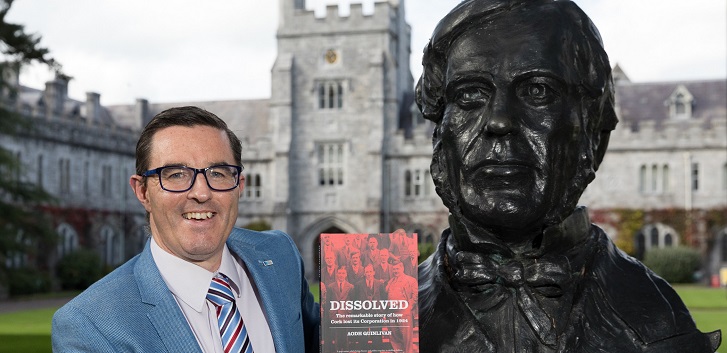Op Ed:The combination of intelligence and ambition can drive Cork

In his excellent new book, Boy Wonder, Dave Hannigan refers to Cork as ‘a state of mind’. It would seem an appropriate location, therefore, to host a full Cabinet meeting, on one of its rare excursions outside of Dublin.
And, within Cork, there could be no better venue than University College Cork. UCC recently published its Strategic Plan 2017-2022 with a vision of ‘a leading university of independent thinkers’. The ambitious plan foresees more than €350m in capital spending across a range of projects. It is great to see UCC proudly express its goals for the future; as Salvador Dali once wrote, ‘intelligence without ambition is a bird without wings’. The University of George Boole has the intelligence and now it also has the ambition. Of course, UCC is not entirely the master of its own destiny and the future brings uncertainty, e.g. political intervention to increase third-level funding, through an increased Government spend or student fees. Part of the uncertainty stems from Brexit which brings with it risks and opportunities. In advance of today's Cabinet meeting, the Minister for Foreign Affairs, Simon Coveney, said that Brexit would feature prominently on the agenda.
It is most likely that Minister Coveney was instrumental in bringing the Cabinet to Cork and UCC. It always helps to have a senior minister from the area. The holding of Cabinet meetings outside of Dublin is rare, but not unique. In the middle of the last decade, the Government took some Cabinet meetings out of the capital, including to Cork in June 2005. Again, the local political dimension was important as Micheál Martin was the Minister for Enterprise, Trade and Employment. The venue in 2005 was the City Hall, in recognition of Cork being the European Capital of Culture. Then Taoiseach, Bertie Ahern, stated at the time that holding Cabinet meetings in different locations across the country was very much welcomed by local communities and provided an opportunity to meet local organisations and groups.
Of course, there has only ever been one Taoiseach from Cork – Jack Lynch. Lynch, born 100 years ago, served as Taoiseach from 1966 to 1973 and from 1977 to 1979. Jack Lynch brought much to Cork – but never a Cabinet meeting! Marking the centenary of Lynch’s birth in August, current Taoiseach, Leo Varadkar, described the famous Corkonian as ‘a notable figure in the political landscape of the 20th century.’ I am sure that Lynch would be very interested in the current political arrangements Dáil Éireann and the era of ‘new politics’. Though not sitting at the table as he was in 2005 when the Cabinet last held a meeting in Cork, Micheál Martin occupies a position of great influence due to the numbers game in parliament.
Therefore, Cork not only has Simon Coveney but also Micheál Martin pushing its case for special attention. Cork’s status as Ireland’s second city is high on the agenda for today's meeting with Minister Coveney speaking in advance of the need to provide a real counterbalance to Dublin. Coveney has promised that there will be a big focus on Cork in the coming months in the context of the National Planning Framework 2040 which envisages an increase of 50% in Cork’s population in the next 20-30 years. As my UCC colleague, Will Brady, wrote in The Irish Times in September, Cork’s success is clearly aligned to the State’s economic interests. If the Government is sincere about effective and balanced regional development, Cork can be the driver in the south of the country but it needs help and major investment. Brady identified two ‘once-in-a-generation decisions about the future of Cork.’ He was referring to the National Planning Framework and the shape of new local government arrangements in the city and county. The latter issue has dominated much of my time over the past two years and, while I am pleased that the ‘merger madness’ is off the table, a decision is urgently needed to end the current controversy. As Jim Mackinnon, the former Scottish Chief Planning Officer, wrote at the end of his report, ‘Cork is not benefiting from the current hiatus. The long-standing question-mark and uncertainty over local government arrangements in Cork has distracted both local authorities from their core mandate. In the meantime, the world is moving on, with new challenges and opportunities presenting themselves.’
Local government arrangements can help or hinder Cork’s ambitions to be the economic driver of this region. It has always been thus, as I demonstrate in my new book, Dissolved: The remarkable story of how Cork lost its Corporation in 1924. Cork Corporation was dissolved in 1924 for blatant political reasons – the councillors had elected the anti-Treaty Seán French as Lord Mayor, a decision which did not sit well with central Government. Cork remained without an elected council for the best part of five years until 1929. In this period – despite the sterling efforts of Commissioner Philip Monahan – Cork suffered from the lack of political leadership and its quest to develop as a counterbalance to Dublin was thwarted. This cannot happen again.
Dr Aodh Quinlivan is a lecturer in the Department of Government and Politics at University College Cork. His latest book, Dissolved: the remarkable story of how Cork lost its Corporation in 1924 is being launched in Cork City Hall on 26 October by the Lord Mayor of Cork, Councillor Tony Fitzgerald, and the President of UCC, Professor Patrick O’Shea.
For more information about the study and research of UCC's Department of Government and Politics visit : Department of Government and Politics
For more on this story contact:
Ruth Mc Donnell, Head Of Media and PR, Office of Marketing and Communications, UCC Mob: 086-0368950
